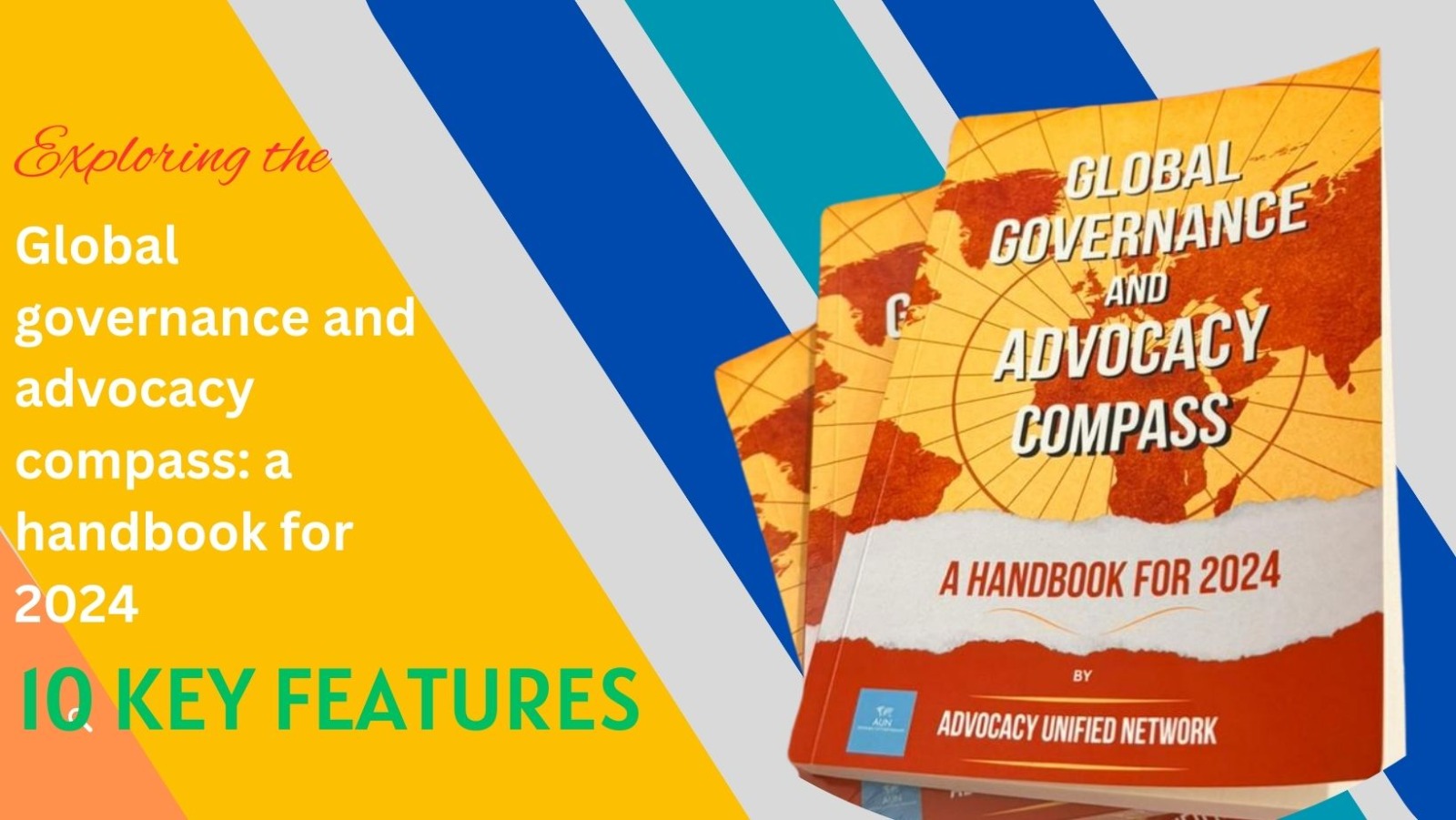As we embark on a journey through the intricate world of global governance, the “Global Governance and Advocacy Compass: A Handbook for 2024” emerges as a beacon of insight and guidance. Let’s explore the ten salient features that define this transformative resource:
Expert Insights:
The “Global Governance and Advocacy Compass: A Handbook for 2024” embodies collaborative efforts from leading experts illuminating global governance complexities. Contributors offer diverse perspectives, enriching understanding across disciplines like political science, economics, sociology, and environmental studies. Through rigorous research and analysis, they delve into topics like policy reform, diplomatic relations, and environmental stewardship, offering nuanced insights. The handbook fosters dialogue and collaboration, encouraging ongoing discourse for positive global change. It stands as a testament to collective wisdom, inspiring readers to engage thoughtfully with global governance challenges in the 21st century.
Comprehensive Coverage:
The “Global Governance and Advocacy Compass: A Handbook for 2024” underscores its commitment to providing readers with an in-depth understanding of the multifaceted landscape of global governance. Through meticulous research and analysis, the handbook traverses a diverse array of topics, ranging from regional elections to international treaties, thereby offering a panoramic view of the events, trends, and issues that defined global governance in 2024.
At its core, the handbook serves as a compendium of knowledge, synthesizing insights from various disciplines and perspectives to present a holistic picture of the global governance landscape. It navigates through the complexities of domestic and international affairs, shedding light on the interconnectedness of political, economic, social, and environmental factors that shape the course of global governance.
From the intricacies of electoral processes in different regions to the dynamics of diplomatic negotiations on the world stage, the handbook leaves no stone unturned in its quest for comprehensive coverage. It explores the evolving nature of governance structures and institutions, examining their strengths, shortcomings, and areas for improvement in the context of contemporary global challenges.
Moreover, the handbook goes beyond mere description, offering critical analysis and insights into the underlying trends and drivers that influence global governance dynamics. Contextualizing events within broader historical, cultural, and geopolitical frameworks enables readers to grasp the underlying forces shaping the global order and anticipate future developments.
The comprehensive coverage provided by the handbook serves as a valuable resource for policymakers, practitioners, scholars, and students alike. It equips them with the knowledge and insights needed to navigate the complexities of global governance, make informed decisions, and drive positive change in their respective spheres of influence.
The handbook reflects its commitment to intellectual rigor, scholarly excellence, and a nuanced understanding of global governance dynamics. By offering a panoramic view of the events, trends, and issues that shaped global governance in 2024, it serves as an indispensable guide for anyone seeking to engage with the challenges and opportunities of our interconnected world.
Timely Analysis:
The “Global Governance and Advocacy Compass: A Handbook for 2024” does not feature a specific section titled “Timely Analysis.” However, its structure and content inherently embody the essence of providing timely insights into the dynamic landscape of global governance.
Through meticulous research, analysis, and synthesis of current events, the handbook offers readers a nuanced understanding of the latest developments shaping global governance. While it may not explicitly label this aspect as “Timely Analysis,” the content is designed to keep readers informed and abreast of emerging trends and shifts in the global arena.
By examining recent events, policy changes, and geopolitical dynamics, the handbook equips readers with the knowledge and insights needed to navigate a rapidly evolving landscape. It provides context to ongoing discussions and debates, allowing readers to understand the implications of current events on global governance structures and processes.
Moreover, the handbook’s contributors, who are leading experts and practitioners in the field, bring their diverse perspectives and expertise to bear on interpreting the significance of contemporary issues. Their analyses serve as a guidepost for readers seeking to make sense of the complexities and uncertainties inherent in global governance.
While the handbook may not explicitly highlight “Timely Analysis” as a feature, its commitment to providing relevant, up-to-date insights underscores its relevance and value in an ever-changing world. By staying attuned to the latest developments and offering informed perspectives, the handbook empowers readers to navigate the complexities of global governance with clarity and foresight.
Actionable Strategies:
The “Global Governance and Advocacy Compass: A Handbook for 2024” serves as a reservoir of practical advocacy and policy intervention strategies, embodying a commitment to empowering readers with actionable insights and best practices. Through a comprehensive exploration of advocacy techniques, policy frameworks, and successful case studies, the handbook equips readers with the tools and knowledge needed to drive positive change in their communities and beyond.
At its core, the handbook recognizes that advocacy and policy intervention are essential components of effecting meaningful change in today’s interconnected world. It goes beyond theoretical discourse to offer tangible solutions and actionable steps that individuals and organizations can implement in their advocacy efforts.
One key aspect of the handbook is its emphasis on evidence-based strategies. Drawing from empirical research and real-world examples, the handbook presents readers with a range of proven approaches to advocacy and policy intervention. By grounding its recommendations in data and analysis, the handbook ensures that readers can make informed decisions and maximize their impact.
Furthermore, the handbook adopts a multidimensional approach to advocacy, recognizing that successful interventions often require collaboration across sectors and disciplines. It highlights the importance of coalition-building, stakeholder engagement, and strategic partnerships in amplifying advocacy efforts and driving systemic change.
Moreover, the handbook underscores the significance of context-specific interventions. Recognizing that every community and issue is unique, it offers a flexible framework that allows readers to tailor their advocacy strategies to local needs and priorities. Whether advocating for environmental sustainability, social justice, or human rights, the handbook provides practical guidance that is adaptable to diverse contexts and challenges.
Central to the handbook’s approach is its commitment to inclusivity and diversity. It amplifies the voices of marginalized communities and underrepresented groups, ensuring that advocacy efforts are inclusive and equitable. By centering diverse perspectives and lived experiences, the handbook fosters more effective and sustainable solutions to global challenges.
The “Global Governance and Advocacy Compass: A Handbook for 2024” stands as a comprehensive resource for individuals and organizations committed to driving positive change in their communities and beyond. By offering practical strategies, actionable insights, and best practices, the handbook empowers readers to become effective advocates for a more just, equitable, and sustainable world.
Global Perspectives:
The “Global Governance and Advocacy Compass: A Handbook for 2024” stands as a testament to its commitment to embracing diverse global perspectives in its exploration of the challenges and opportunities of global governance. Through contributions from thought leaders and practitioners hailing from various corners of the globe, the handbook offers readers a comprehensive and inclusive outlook on the complexities of global governance dynamics.
At its essence, the handbook recognizes that global governance issues transcend geographical boundaries and cultural contexts. Incorporating insights from diverse voices enriches the discourse and fosters a more holistic understanding of the multifaceted challenges facing our interconnected world.
The contributions within the handbook reflect a tapestry of perspectives, experiences, and expertise. From scholars and policymakers to activists and practitioners, each author brings a unique lens through which to examine global governance issues. This diversity of voices not only broadens the scope of the discussion but also sheds light on overlooked perspectives and marginalized narratives.
Moreover, the handbook embraces the principle of inclusivity, ensuring that voices from both established and emerging regions are represented. By amplifying the voices of underrepresented communities and marginalized groups, it seeks to democratize the discourse surrounding global governance and promote equity and justice in decision-making processes.
By presenting a truly global outlook, the handbook enables readers to transcend parochialism and embrace a more cosmopolitan perspective on global governance challenges. It encourages readers to critically engage with differing viewpoints, interrogate assumptions, and cultivate empathy and understanding of diverse experiences and realities.
Furthermore, the contributions within the handbook reflect a commitment to dialogue and collaboration across borders. The handbook lays the groundwork for collective action and solidarity in addressing global governance challenges by fostering connections among scholars, practitioners, and activists from diverse backgrounds.
The “Global Governance and Advocacy Compass: A Handbook for 2024” serves as a testament to the power of diversity and inclusion in shaping our collective understanding of global governance. Through its embrace of diverse global perspectives, it empowers readers to navigate the complexities of the global landscape with empathy, insight, and resilience.
Cross-disciplinary Approach:
The “Global Governance and Advocacy Compass: A Handbook for 2024” pioneers a cross-disciplinary approach to understanding global governance, recognizing that the complexities of today’s world demand insights from a multitude of fields. By bridging disciplinary boundaries and drawing from diverse areas of study such as political science, economics, law, and sociology, the handbook offers readers a comprehensive and nuanced understanding of the interconnected nature of global issues.
At its core, the cross-disciplinary approach adopted by the handbook acknowledges that global governance issues are multifaceted and inherently interconnected. Rather than siloing discussions within specific disciplines, the handbook encourages scholars, practitioners, and policymakers to engage in interdisciplinary dialogue and collaboration.
Political science offers insights into the structures and mechanisms of global governance, exploring the roles of states, international organizations, and non-state actors in shaping global policies and institutions. Economics provides valuable perspectives on the distribution of resources, economic inequalities, and the impacts of globalization on different regions and populations.
Law contributes to the understanding of legal frameworks, treaties, and international agreements that govern interactions among nations and address transnational challenges such as human rights violations and environmental degradation. Sociology sheds light on the social dimensions of global governance, including issues of identity, power dynamics, and social movements that shape global agendas and policies.
By integrating insights from these diverse disciplines, the handbook offers a holistic understanding of global governance that transcends narrow disciplinary boundaries. It encourages readers to consider the interconnectedness of political, economic, legal, and social factors in shaping the global landscape and driving change at local, national, and international levels.
Moreover, the cross-disciplinary approach fosters innovation and creativity in addressing complex global challenges. It encourages scholars and practitioners to draw upon a range of methodologies, theories, and perspectives to develop holistic solutions that address the root causes of global problems and promote sustainable development.
The cross-disciplinary approach of the “Global Governance and Advocacy Compass: A Handbook for 2024” exemplifies a commitment to intellectual diversity and collaboration in addressing global governance issues. By drawing from political science, economics, law, sociology, and other fields, the handbook offers readers a rich tapestry of insights and perspectives that inform and inspire informed action and positive change in the global arena.
Accessible Language:
The accessibility of the “Global Governance and Advocacy Compass: A Handbook for 2024” is a cornerstone of its design, ensuring that both experts and newcomers can engage with its content effectively. Through the use of clear and concise language, the handbook endeavors to convey complex ideas in a manner that is understandable and relatable, making it an invaluable resource for students and practitioners at all levels of expertise.
One of the primary challenges in discussing global governance is the inherent complexity of the subject matter. It involves intricate systems, processes, and institutions that can be daunting to comprehend, especially for those who are new to the field. Recognizing this challenge, the handbook adopts a reader-friendly approach that prioritizes clarity and simplicity without sacrificing depth or rigor.
By employing clear and concise language, the handbook demystifies complex concepts and distills them into digestible nuggets of information that are accessible to readers from diverse backgrounds. Whether exploring the intricacies of international treaties, dissecting the nuances of diplomatic negotiations, or analyzing the implications of global trends, the handbook presents information in a manner that is easy to understand and engaging to read.
Moreover, the accessibility of the handbook extends beyond its language to its overall structure and organization. It is thoughtfully curated to guide readers through complex topics in a logical and intuitive manner, providing clear signposts and explanations along the way. This allows readers to navigate the handbook with ease, regardless of their prior knowledge or experience in the field of global governance.
Importantly, the accessibility of the handbook does not compromise its depth or scholarly rigor. While it may present complex ideas in a simplified manner, it does so without oversimplifying or trivializing the subject matter. Instead, it strikes a balance between accessibility and intellectual depth, ensuring that readers are equipped with a solid understanding of key concepts and principles.
The accessibility of the “Global Governance and Advocacy Compass: A Handbook for 2024” makes it an indispensable resource for students and practitioners alike. By employing clear and concise language to convey complex ideas, the handbook empowers readers to engage meaningfully with the intricacies of global governance, regardless of their level of expertise or familiarity with the subject matter.
Practical Case Studies:
The accessibility of the “Global Governance and Advocacy Compass: A Handbook for 2024” is a cornerstone of its design, ensuring that both experts and newcomers can engage with its content effectively. Through the use of clear and concise language, the handbook endeavors to convey complex ideas in a manner that is understandable and relatable, making it an invaluable resource for students and practitioners at all levels of expertise.
One of the primary challenges in discussing global governance is the inherent complexity of the subject matter. It involves intricate systems, processes, and institutions that can be daunting to comprehend, especially for those who are new to the field. Recognizing this challenge, the handbook adopts a reader-friendly approach that prioritizes clarity and simplicity without sacrificing depth or rigor.
By employing clear and concise language, the handbook demystifies complex concepts and distills them into digestible nuggets of information that are accessible to readers from diverse backgrounds. Whether exploring the intricacies of international treaties, dissecting the nuances of diplomatic negotiations, or analyzing the implications of global trends, the handbook presents information in a manner that is easy to understand and engaging to read.
Moreover, the accessibility of the handbook extends beyond its language to its overall structure and organization. It is thoughtfully curated to guide readers through complex topics in a logical and intuitive manner, providing clear signposts and explanations along the way. This allows readers to navigate the handbook with ease, regardless of their prior knowledge or experience in the field of global governance.
Importantly, the accessibility of the handbook does not compromise its depth or scholarly rigor. While it may present complex ideas in a simplified manner, it does so without oversimplifying or trivializing the subject matter. Instead, it strikes a balance between accessibility and intellectual depth, ensuring that readers are equipped with a solid understanding of key concepts and principles.
The accessibility of the “Global Governance and Advocacy Compass: A Handbook for 2024” makes it an indispensable resource for students and practitioners alike. By employing clear and concise language to convey complex ideas, the handbook empowers readers to engage meaningfully with the intricacies of global governance, regardless of their level of expertise or familiarity with the subject matter.
Policy Recommendations:
Within the pages of the “Global Governance and Advocacy Compass: A Handbook for 2024,” readers will find a wealth of actionable policy recommendations meticulously informed by rigorous research and analysis. These recommendations serve as a guiding light for policymakers and advocates navigating the complex terrain of global challenges, offering concrete steps to address pressing issues and drive positive change.
At the heart of the handbook’s policy recommendations lies a commitment to evidence-based decision-making. Drawing upon rigorous research methodologies, data analysis, and expert insights, the recommendations are grounded in a deep understanding of the underlying dynamics and root causes of global challenges. By synthesizing the latest research findings and empirical evidence, the handbook ensures that its recommendations are rooted in sound scholarship and informed by real-world experience.
Furthermore, the handbook goes beyond the mere diagnosis of problems to offer practical solutions and strategies for action. It identifies key leverage points and intervention opportunities where policymakers and advocates can make a meaningful impact on pressing global issues. Whether addressing climate change, human rights violations, economic inequality, or other critical challenges, the handbook provides concrete steps that can be taken at local, national, and international levels.
Importantly, the policy recommendations presented in the handbook are context-specific and tailored to the unique challenges and opportunities faced by different regions and communities. Recognizing that one-size-fits-all approaches often fall short in addressing complex global problems, the handbook offers flexible and adaptable strategies that can be customized to suit diverse contexts and priorities.
Moreover, the handbook emphasizes the importance of collaboration and stakeholder engagement in implementing its policy recommendations. It recognizes that effective policy interventions require the participation and support of a wide range of actors, including governments, civil society organizations, businesses, and communities. By fostering dialogue, partnerships, and coalitions, the handbook seeks to mobilize collective action and amplify the impact of advocacy efforts.
The “Global Governance and Advocacy Compass: A Handbook for 2024” serves as a beacon of hope and empowerment for policymakers and advocates striving to address pressing global challenges. Through its actionable policy recommendations informed by rigorous research and analysis, the handbook offers a roadmap for driving positive change and building a more just, equitable, and sustainable world.
Community Engagement:
The “Global Governance and Advocacy Compass: A Handbook for 2024” extends an invitation to join a vibrant community of advocates and change agents dedicated to shaping the future of global governance. Serving as a catalyst for dialogue, collaboration, and collective action, the handbook fosters a sense of shared purpose and solidarity among its readers.
At its core, the handbook recognizes the power of collective action in driving meaningful change on a global scale. It acknowledges that addressing complex challenges such as climate change, human rights violations, and economic inequality requires concerted efforts from individuals, organizations, and communities across the globe.
Through its pages, the handbook seeks to bring together diverse voices and perspectives, creating a space for dialogue and exchange of ideas. It provides a platform for advocates, policymakers, scholars, and practitioners to connect, share insights, and learn from each other’s experiences.
Moreover, the handbook serves as a repository of best practices and successful advocacy strategies, offering readers practical guidance on how to effect change in their respective spheres of influence. By highlighting case studies, success stories, and lessons learned from around the world, the handbook inspires readers to take action and make a difference in their communities and beyond.
Importantly, the handbook encourages collaboration and partnership among stakeholders with different backgrounds, expertise, and resources. It recognizes that tackling global challenges requires a multidisciplinary approach and the collective mobilization of diverse talents and perspectives.
By fostering a sense of shared purpose and solidarity, the handbook empowers its readers to transcend individual interests and work towards common goals. It instills a sense of agency and responsibility, reminding readers that they have the power to shape the future of global governance through their actions and advocacy efforts.
Ultimately, the “Global Governance and Advocacy Compass: A Handbook for 2024” is more than just a resource—it is a call to action and a rallying cry for collective engagement. It invites readers to join a global community of changemakers committed to building a more just, equitable, and sustainable world through dialogue, collaboration, and collective action.
As we navigate the complexities of our globalized world, the “Global Governance and Advocacy Compass: A Handbook for 2024” stands as a testament to the power of knowledge, collaboration, and informed action. Empowering readers to become informed and engaged global citizens serves as a roadmap for a more just, equitable, and sustainable future.
Citation:
Yokuba, A. (2024). Exploring the “Global Governance and Advocacy Compass: A Handbook for 2024” – 10 Key Features. Zenodo.





